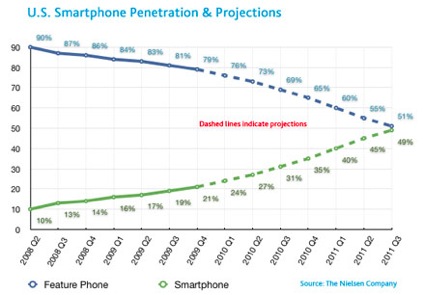Yesterday, Gordon Snyder shared his thoughts on Verizon, Google, the FCC and Real Net Neutrality?
What's particularly troubling is that Google, Verizon and virtually anyone with a pulse knows that the mobile web is going to dominate the future and that the traditional, fixed Internet as we know it is, increasingly, going to marginalized. In fact, this is already happening and accelerating.
Conservative estimates are that mobile web browsing will be the norm as early as 2015. What happens to the end-user (you and me) when the mobile web IS the Internet and Verizon controls the "valve" - for a price.
Consider one potential scenario in my industry - education. Blackboard is the market-leader in learning management systems (LMSs), gobbling up smaller competitors (WebCT, Angel) and related companies (iStanford, Wimba, Elluminate). One of the few alternatives to Blackboard are open source LMSs such as Moodle or Sakai. Is there a future where Blackboard pays for priority of mobile traffic, essentially locking out resource-poor open source competitors?
Some interesting push back has come from a seemingly unlikely source Facebook.
Facebook at Odds With Google, Verizon on Net Neutrality:
Facebook Wednesday took issue with Google and Verizon’s proposal to exempt cellular networks from rules that would ensure equal treatment of Internet traffic, saying the social-networking giant supports equal treatment on “both landline and wireless networks.”
The battle lines are pretty clear. Facebook has grown tremendously (500 million users and growing) with no "help" from Verizon or other carriers. As Facebook continues to monetize their users and content, Verizon et. al. want a piece of the pie.
Jeff Jarvis's thoughts Internet, schminternet are worth a read too
I am baffled by the Google-Verizon agreement on nonnet-nonneutrality. I’m mostly baffled by why Google would put its name to this. What does it gain?
As I see it, the agreement makes two huge carve-outs to neutrality and regulation of the internet: mobile and anything new.
So ol, grandpa internet may chug along giving us YouTube videos of flaming cats, but you want to get that while you’re out of your house? Well, that’s the nonnet. I can hear the customer “service” rep explaining this to us:
“Oh, no, sir. That’s not offered on the internet. That’s on the schminternet.”
You want something new? Anything created after 2010?
“Schminternet, sir.”
And transparency in essence creates a third carve-out: So long as the phone company tells you it’s screwing your bits, it’s ok.
But wait. Mobile is the internet. Mobile will very soon become a meaningless word when — well, if telcos allow it, that is — we are connected everywhere all the time. Then who cares where you are? Mobile? doesn’t matter. You’re just connected. In your car, in your office, in your bedroom, on the street. You’re connected. To what? To the internet, damnit.





